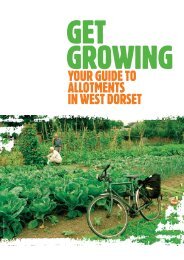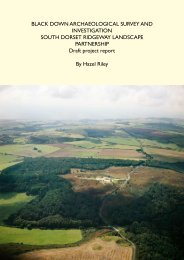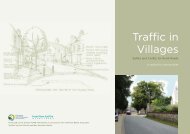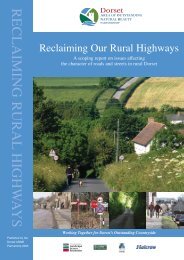Woodland Strategy 11.34 Mb - the Dorset AONB
Woodland Strategy 11.34 Mb - the Dorset AONB
Woodland Strategy 11.34 Mb - the Dorset AONB
Create successful ePaper yourself
Turn your PDF publications into a flip-book with our unique Google optimized e-Paper software.
Section 5<br />
The Future<br />
34<br />
This strategy is <strong>the</strong> start of a process. It identifies aims and objectives and sets out policies<br />
focused on <strong>the</strong> key issues facing trees, woods and forests in <strong>Dorset</strong>. The future of <strong>Dorset</strong>’s<br />
trees, woods and forests will be dependent on <strong>the</strong> ability of those involved in <strong>the</strong>ir<br />
management to adapt to new demands, opportunities and markets, aided by <strong>the</strong> support<br />
of local and central government.<br />
Biodiversity, economics and social needs are intrinsically linked to successful management of<br />
woods and forests. What is needed is sound advice and support to re-energise and add value<br />
for <strong>the</strong> owners, whe<strong>the</strong>r <strong>the</strong> main purpose is for wood products, recreation, biodiversity or<br />
social benefit.<br />
Predicting <strong>the</strong> future is impossible, but with <strong>the</strong> growing evidence for climate change we can<br />
be sure that changes will occur. Climate change will impact on trees, woods and forests that<br />
exist and predictions suggest that while some tree species, such as beech could not tolerate<br />
<strong>the</strong> change, species such as Douglas fir could be grown more extensively in <strong>Dorset</strong> and <strong>the</strong><br />
South West.<br />
New woodland planting © David Rees<br />
The Nottingham Declaration on Climate Change is a voluntary pledge to address <strong>the</strong> issues of<br />
climate change. It represents a high-level, broad statement of commitment that any council<br />
can make to its own community. The declaration was originally launched in October 2000 at<br />
a conference in Nottingham with 200 leaders, chief executives and senior managers of UK<br />
local government. To mark <strong>the</strong> fifth anniversary of <strong>the</strong> declaration it was re-launched on 5<br />
December 2005 at <strong>the</strong> second National Councils Climate Conference. The new version of <strong>the</strong><br />
declaration is broadly similar to <strong>the</strong> original, but better reflects current thinking. To date<br />
<strong>Dorset</strong> County Council, West <strong>Dorset</strong> District Council, Weymouth and Portland Borough<br />
Council, Purbeck District Council and Bournemouth Borough Council have all signed up.<br />
Government and local policies already exist to reduce carbon emissions and schemes exist<br />
that enable <strong>the</strong> off-setting of carbon by funding tree planting or renewable energies in<br />
various parts of <strong>the</strong> world. Opportunities in <strong>Dorset</strong> are being investigated with <strong>the</strong> aim<br />
of providing a carbon off-setting scheme to enable <strong>the</strong> planting of community/urban<br />
forests, providing green infrastructure, reducing habitat fragmentation and supporting <strong>the</strong><br />
installation of biomass boilers.<br />
In <strong>the</strong> timber industry prices for homegrown<br />
timber have been depressed for over ten<br />
years, but new markets are opening up with<br />
<strong>the</strong> help of new technologies, particularly<br />
for small round wood and co-products such<br />
as woodchip. Recreation is beginning to<br />
generate income for woodland owners<br />
whilst <strong>the</strong> market for sawn timber in<br />
construction and furnishings is growing.<br />
All this is leading to stronger demand and<br />
higher price, which is helping woodland<br />
owners and businesses to expand and plan<br />
for <strong>the</strong> future more positively than for<br />
many years.<br />
Woods and forests managed commercially<br />
Chipping for woodfuel © Forestry Commission retain <strong>the</strong>ir value in several ways, whe<strong>the</strong>r<br />
for timber, biodiversity, recreation,<br />
education, shooting or o<strong>the</strong>r social benefits, examples being Moors Valley Country Park at<br />
Ringwood and Wareham Forest. With <strong>the</strong> right type of management woods and forests can<br />
support and enhance <strong>the</strong>se uses, with many areas being able to sustain ‘multi-use’ activities.<br />
In addition to <strong>the</strong> historic environment, native species and habitats being under threat from<br />
lack of management, <strong>the</strong>re is a very real threat from rising deer numbers and non-native<br />
species such as grey squirrels and rhododendron. These species need to be controlled to<br />
enable our native woodland flora and fauna to flourish and regenerate naturally.












